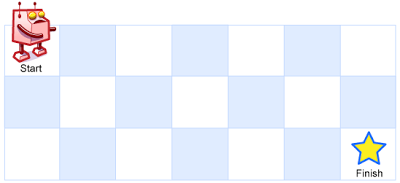[LeetCode] 062. Unique Paths *
-
date_range April 09, 2019 - Tuesday infosortAlgorithmlabelleetcodepythondynamic programming
Problem (Medium)
A robot is located at the top-left corner of a m x n grid (marked ‘Start’ in the diagram below).
The robot can only move either down or right at any point in time. The robot is trying to reach the bottom-right corner of the grid (marked ‘Finish’ in the diagram below).
How many possible unique paths are there?
 |
|---|
| Above is a 7 x 3 grid. How many possible unique paths are there? |
Example 1:
- Input: m = 3, n = 2
- Output: 3
- Explanation:
From the top-left corner, there are a total of 3 ways to reach the bottom-right corner:
- Right -> Right -> Down
- Right -> Down -> Right
- Down -> Right -> Right
Example 2:
- Input: m = 7, n = 3
- Output: 28
Approach 1: Dynamic Programming *
Idea
Since the robot can only move right and down, when it arrives at a point, it either arrives from left or above. If we use dp[i][j] for the number of unique paths to arrive at the point (i, j), then the state equation is dp[i][j] = dp[i][j - 1] + dp[i - 1][j]. Moreover, we have the base cases dp[0][j] = dp[i][0] = 1 for all valid i and j.
Solution
class Solution1:
def uniquePaths(self, m, n):
"""
:type m: int
:type n: int
:rtype: int
"""
dp = [[0 for _ in range(m)] for _ in range(n)]
for i in range(m):
dp[0][i] = 1
for j in range(n):
dp[j][0] = 1
print(dp)
for i in range(1, n):
for j in range(1, m):
dp[i][j] = dp[i-1][j] + dp[i][j-1]
return dp[-1][-1]
Complexity
- Time: $O(mn)$
- Space: $O(mn)$
Approach 2: Dynamic Programming Improved *
Idea
The above solution runs in O(m * n) time and costs O(m * n) space. However, you may have noticed that each time when we update dp[i][j], we only need dp[i - 1][j] (at the previous row) and dp[i][j - 1] (at the current row). So we can reduce the memory usage to just two rows (O(n)).
Solution
class Solution2:
def uniquePaths(self, m, n):
"""
:type m: int
:type n: int
:rtype: int
"""
pre_row = [1 for i in range(m)]
cur_row = [1 for i in range(m)]
for i in range(1, n):
for j in range(1, m):
cur_row[j] = pre_row[j] + cur_row[j-1]
cur_row, pre_row = pre_row, cur_row
return pre_row[-1]
Complexity
- Time: $O(mn)$
- Space: $O(n)$
KF
